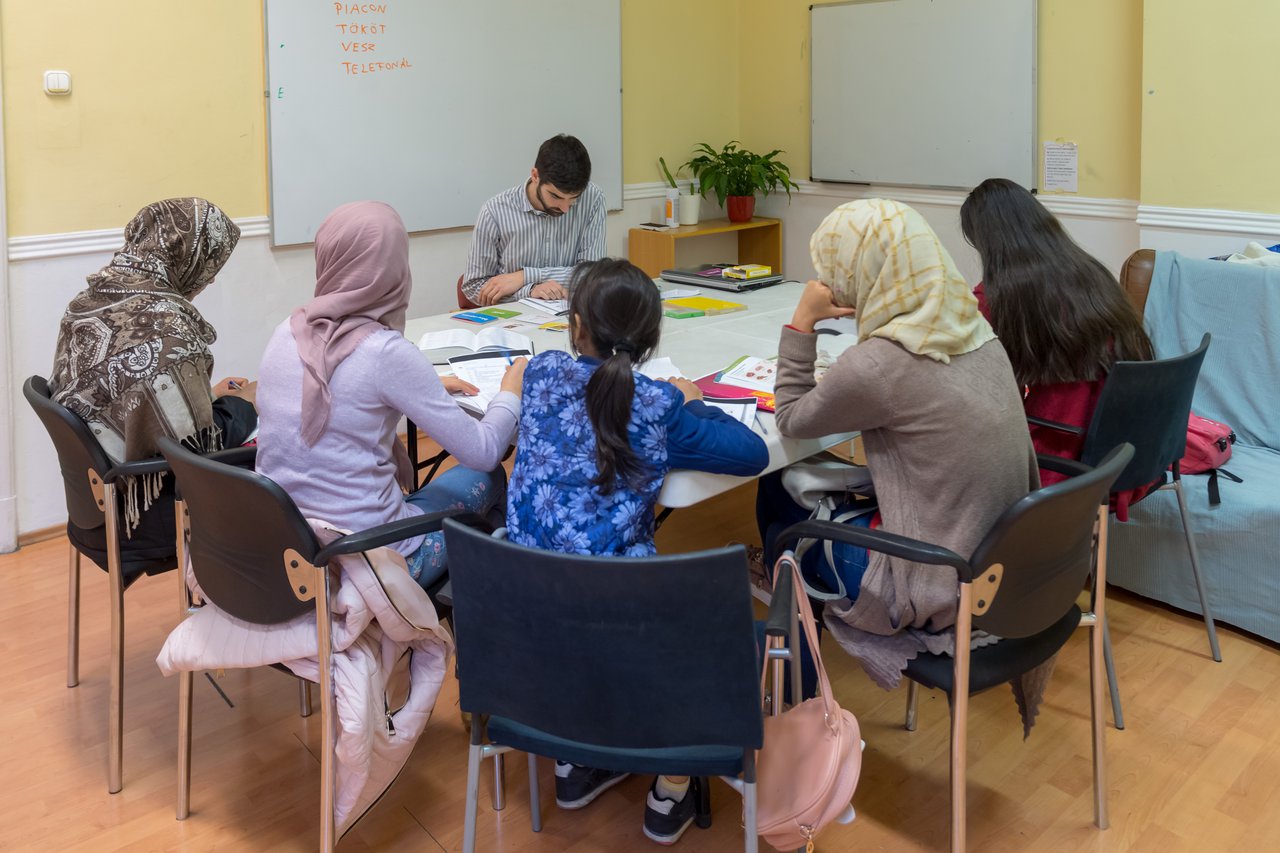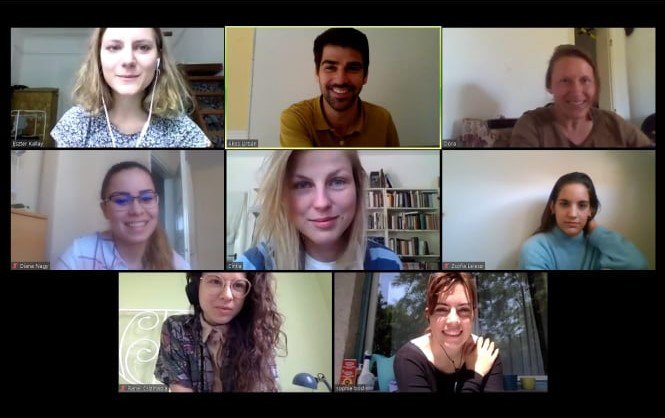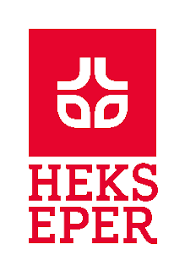The job is done well when refugee students are constantly starting classes and leaving. If the teaching is good, the acknowledgment is appreciated by the teacher. But this is where one must take careful measures, and use their participation in these interactions carefully, Ákos Urbán explains. As a teacher of Kalunba Social Services Ltd. and the Diaconal Office of RCH, supported by the Swiss Church Aid (HEKS/EPER), he discussed important matters such as identity, human relationships and various experiences with his students.

Please tell me a little about yourself and your background.
My name is Ákos Urbán, I’m 32 years old. Since my birth in Gyula, I have lived in six different places. Till the age of 14, I lived in Vértesboglár, a small village in Fejér County. I attended high school in Székesfehérvár and then university in Debrecen. After graduation, it was very hard to find a job so I went back to Vértesboglár to teach. After one year I moved to Budapest, where I had at least four jobs in one year. I worked in Germany for a little while and then I came back to Hungary and started working in the Drug Rehabilitation Ministry. I joined Kalunba in 2015 as a volunteer and then as a teacher in 2016. I believe that professions, such as teaching, no longer interest people. Although my teaching job at Kalunba is the reason we are talking right now.
Since high school literature really interested me, and whenever I had the opportunity, I would always choose that among classes. This wasn’t really possible to pursue at a university level, because of the lack of possibilities, but I am still working on writing professionally. My first book was published in 2015 and have since been working on my second. I am currently in the third year of my sociology studies and hopefully will soon finish.
How did you find Kalunba, what led you there?
After finishing high school, I couldn’t decide where to go. Literature is what I am most interested in and was able to progress in that field some, as mentioned earlier. Everybody in my parents’ generation is an engineer, with the exception of my mother’s sibling, who has studied economy. My interest in humanities possibly came from my grandfather, who was a teacher in a small village in Upper Hungary. Teaching minorities was dear to his heart and he even wrote a monograph about it. I spent a lot of time with him during my high school year after my grandmother died and he moved in with us. My interest in this field was inspired deeply in this period. I wrote my thesis on research the history of teaching minorities and language disadvantages in Hungary. When I came back from Germany I realised that in order to earn a decent living, I would need to seek employment outside of the public education sector. That’s how I ended up in the drug mission where we operated a cafe. In the end I still wasn’t doing the job I applied for, because I was stuck as a barista, so I had to leave and joined Kalunba. In Hungary the education field has the highest number of people abandoning it. I’ve been working with my colleague Eszter since January of 2020 and I hope we will be able to work together for a long time.

What is your motivation, how do you see your job?
My motivation, the reason I think this is good for me is because of my identity. I talked about my grandfather, who inspired the picture of an ideal teacher for me. It is important to my identity, that I am Hungarian and I am Christian. If we think about what the task of a modern nation State is, then we can think about responsibilities such as providing public services like education, healthcare, and social sectors. My experience is in Hungary these fields are very diverse in physical and non-physical space, for example there are regions where it is possible to execute them well but there are regions where these don’t work at all. The political willingness is differing as well regarding this. In topics about morality refugees are always up for debate. For me personally it doesn’t matter if someone’s a refugee, migrant or if they’re coming for a different reason. If someone’s here because of economic factors and they worked for a European company before in their country of origin but the country didn’t really pay attention to public needs, or if they were already working in a German company, can one think that they can migrate to Germany? I don’t think that there are extreme answers to this, like yes or no and it’s a relief that I am not the one deciding whether they can or can’t go. It is a relief that I am working as an educator. If the help becomes beautiful or even noble, the acknowledgement will grow as well. It is very important how I use this acknowledgment and how I participate in these interactions as a teacher. I think we shouldn’t emphasize the one helped and the helped one relationship, but rather a human-human one.
"We Encourage People to Stay"
The Reformed Alliance in Germany was one of the international partners that supported the work of Kalunba. Isabel Metzger, journalist of the reformiert-info.de, interviewed Dóra Kanizsai-Nagy for an update on their situation since July 2018. Here we publish the English translation of the original article printed in German.
What kind of success do and did you experience?
Surviving through even the toughest years and being stretched to our limits, we here at Kalunba are the biggest success story. We had a former client who had become my colleague and then was accepted to Humbolt University in Berlin. He has now been chosen by the European Commission to be a member of an expert group in the fields of migration. I feel quite successful in general, it’s good that I have the experience as an educator. Working in the refugee field in Hungary certainly has its challenges, but there are still victories to be had. University education along with all its benefits is readily available to all, including refugees, and results in their successful integration. I am not going to say that it’s easy, but I also don’t want to go and feel sorry for myself that it is so hard to work in the refugee field in Hungary either. Luckily I don’t feel like I am burning out yet. Another good thing is, that things like higher education and all the benefits coming with it are available not only for the upper class like it used to be, but even for refugees. I think it’s great and proves a very good manifestation of successful integration.

The After-school program of RCH implemented by Kalunba has been supported by HEKS, the aid organisation of Swiss Protestant Churches, a strategic partner of RCH in terms of support and integration of refugees, with a special focus on families and youth. The strategic cooperation in the framework of the so called Country Program, outlined in the project “Promotion of Life Perspectives and Integration of Refugees in Hungary” has been crucial for RCH. “Integration into Hungarian society is difficult for refugees, and worsened by recent legal changes, putting more stress on families as they seek ways to survive with ever dwindling support from the authorities. Students struggle to integrate into schools, refugees and migrants are not getting all the necessary practical knowledge to thrive in Hungary, and the average Hungarian citizen does not step up to help fill these gaps,” reads in the joint project proposal. “The RCH recognizes these issues and seeks to play a larger role in the integration and care of refugees in Hungary. Therefore through this program, and with the help of HEKS, this project will allow the RCH to take ownership for and further develop its refugee ministry. The Kalunba Social Services Ltd, Implementing Partner of the RCH, will support the refugee ministry and help to spread this work into the church’s wider congregational life through its partnership with the RCH’s Diaconal Office. Through this, sensitization programs and educational assistance will be provided,” summarizes the strategic document.
I am very interested in how a typical day looked like before the pandemic, and how it looks like now, under restrictions?
When we still had physical contact, before the pandemic, I usually had my classes after school so I went to work around 9-10am and went home at 5pm. We usually provided 20 or sometimes above 30 hours of education a week. Now it went down to 13 online and not because the students are unavailable, but because this is how much time we have. I had no problem attending my university classes and doing my classes at work at the same time before the Coronavirus, but now I am only able to do 3 or 4 hours between my online university classes. This is very awkward, because when I have work one or two children can come home earlier from afterschool once a week and we can start from 2pm and we can finish around 7pm. I don’t understand why it is so different, because logically thinking, it should be the opposite. I feel like my work hours are higher but my teaching hours are lower, while I am only staying home. I am trying to finish everything by 7pm because of the restrictions on curfew so I can take care of other things as well.
Children starting school tend to speak Hungarian better, so usually volunteers are dealing with them. I’m not saying that teaching is easier, but it is much easier to coach children in their first years of education. Those who are older are more behind in terms of language.
Volunteers from the Károli Gáspár University of the Reformed Church also have been coming to us for years. Students can complete their internship program required by the university in Kalunba. It’s a pretty honorable thing and we try to be good partners.
What do you plan for the future, how would you like to see the everyday life of Kalunba?
I would like to see the vivid life returning to Kalunba after the virus. I would like the education sector to stay open so more people could join as students, as teachers or as volunteers. It is important to let more people participate and show the youth how things like these work. There are many curious ones already that are coming. I want this kind of openness and I think that integration with good efficiency also contains this kind of behavior, like people coming and going more than once a day and not only those people are there who have nothing else to do to or nowhere to stay, but the teachers and students, or classmates of students who can see the environment for themselves. This is my dream regarding this, but right now I would be happy just for physical meetings to happen too.
Proofread by: Jeanie Lee
Mutual Understanding Is Part Of The Work
Eszter Kállay, a teacher at Kalunba Social Servies Ltd. supported by Swiss Church Aid (HEKS/EPER) shared her thoughts and experiences as well as plans for the future, when face-to-face interaction will be possible again.
Read more about the Refugee Ministry of RCH
The Refugee Ministry of the Reformed Church in Hungary is organized under the Unit for Refugee Integration, which is part of the RCH’s Diaconal Office and works with Kalunba Social Services Nonprofit Ltd. as implementing partner. Get to know our vision, strategy, organisation, structures, cooperations and read the latest news.